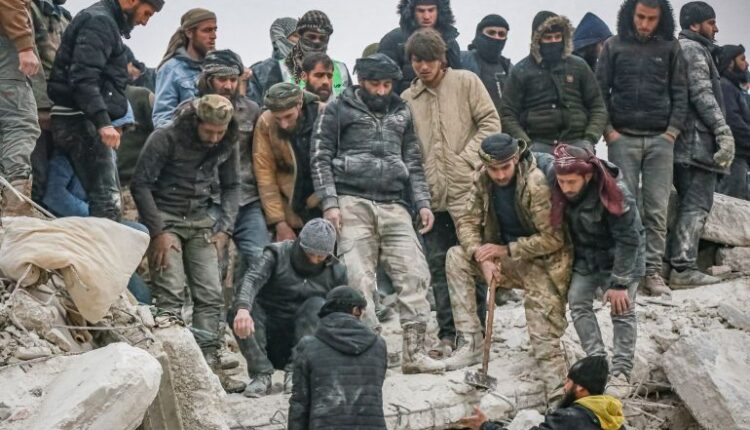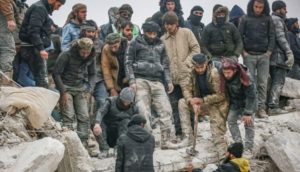The scale of the destruction in the aftermath of the earthquake that hit swaths of Turkey and Syria on Monday has been unprecedented, even for residents of the war-torn country.
On the Syrian side, the area affected by the 7.8-magnitude quake and its aftershocks is divided between government-controlled territory and the country’s last opposition-held pocket of land, encircled by Russian-backed government forces.
The sound of air raids is a regular occurrence for the estimated 4.5 million residents in the besieged enclave, but the roar of multiple buildings crumbling to the ground in unison was a new calamity.
Ismail Alabdullah, a volunteer with the White Helmets in Idlib governorate, said at least five residential buildings had collapsed in the village of Sarmada, where his team has been racing to find survivors for more than 30 hours.
Each apartment in the multistorey residential blocs “had a family living in it”, Alabdullah told Al Jazeera. “It will take us days, if not weeks, to reach the last person.”
At least 790 people were killed in Syria’s opposition-held northwest and 2,200 injured with the toll expected to rise, according to data collected by the White Helmets.
The rescue group operating in opposition-controlled parts of Syria, also known as the Syrian Civil Defence, has been shuttling its few available excavators from one town to the next to respond to countless pleas for help.
But resources are insufficient and often volunteers have resorted to digging with their bare hands. “Hundreds of people are still under the rubble, but we don’t have enough equipment to get to them out,” Alabdullah said.
Attempts to reach survivors have been hampered by rain, below-freezing temperatures and close to 200 aftershocks threatening to further collapse buildings that have already come down, as well as the standing war-battered buildings.
Survivors have camped out on the streets or joined tented encampments where resources were already stretched thin before the tremors, the volunteer added.
Humanitarian organisations have said the earthquake has added another layer to the suffering of the population in northwestern Syria, where some 4.1 million people require assistance.
“People are traumatised, they feel helpless,” Adnan Hazem, Syria spokesperson for the International Committee of the Red Cross (ICRC), told Al Jazeera.
The region had already been grappling with the first cholera outbreak in a decade and braving snowstorms amid fuel shortages when the quake hit.
The needs now are “enormous”, Hazem said.
Delivering aid to north-west Syria
Countries around the world have dispatched teams to assist rescue efforts in Turkey and the country’s disaster management agency said more than 24,400 emergency personnel are already on the ground.
But aid delivery to the last pocket of Syria still beyond the control of Syrian President Bashar al-Assad has remained problematic after more than a decade of war.
“No one has contacted us to offer help,” the White Helmets’ Alabdullah said.
Northwestern Syria has become one of the hardest places to reach, with only one crossing available to transport aid from Turkey to opposition-held areas. The quake’s epicentre in the nearby Turkish town of Gaziantep, an important United Nations aid hub for northern Syria, was among the cities affected.
The UN Office for the Coordination of Humanitarian Affairs (OCHA) said the earthquake has disrupted the vital flow of cross-border aid.
“We are facing a temporary disruption because of the roads, particularly the road between Gaziantep and Reyhanli,” OCHA spokesperson Madevi Sun-Suon told Al Jazeera.
Not being able to reach Reyhanli, a main transhipment hub where the UN agency carries out monitoring operations and verification work before aid trucks cross into Syria, “has been a key challenge”, Sun-Suon said.
The aid delivery mechanism across Turkey’s border at the Bab al-Hawa crossing established in 2014 is the only way UN assistance can reach civilians without navigating areas controlled by Syrian government forces.
It has provided more than 80 percent of the needs of people living in rebel-controlled areas.
The al-Assad government has systematically denied humanitarian assistance to large swaths of its population since a popular uprising in 2011, seeking the surrender of opposition-controlled areas. Russia, one of al-Assad’s closest backers, argued that the humanitarian mission violates Syria’s sovereignty.
Amnesty International on Monday called on the international community to mobilise resources and on the Syrian government to “allow aid to reach all areas affected by the earthquake without restriction”.
Reports by opposition media of shelling overnight in the city of Marea could also complicate rescue efforts. Syrian civil rights associations have called on the international community to put pressure on al-Assad and his allies to halt the bombing of the areas affected by the earthquake.
Syrian regime areas
State news agency SANA said on Tuesday that at least 812 people had been killed in the government-held areas of Aleppo, Latakia, Hama, Idlib and Tartous, bringing the total in the country to at least 1,602 people.
The United Arab Emirates has pledged around $13.6m in humanitarian assistance to Syria, state media reported, while Algeria announced its participation in the rescue operations with a specialised civil protection team.
Syria’s government denied that it had requested Israeli assistance after Tel Aviv said it received a call for help and that it was prepared to oblige, in what would have been a rare moment of cooperation between the neighbouring countries.
Syria and Israel are technically at war, and Israel has been believed to conduct regular air attacks targeting pro-Iranian military sites in the country.
Western governments are expected to deliver aid to Syria through nongovernmental organisations to avoid engaging with al-Assad’s government, which they do not recognise as legitimate.
The United States said it was “committed” to helping residents “on both sides” of the Turkey-Syria border, but ruled out dealing directly with the Syrian government.
United Kingdom Foreign Secretary James Cleverly said providing aid to Syria was “complicated”, and added the UK was “working through our UN partners on the ground”.
But UN-backed humanitarian programming in northwest Syria has been underfunded for years and lacks natural disaster planning.
The Syria Humanitarian Response Plan (2022-2023) obtained less than 50 percent of the required $4bn, with the earthquake only increasing the gap between the funds and the needs on the ground.
UN Secretary-General Antonio Guterres said that the UN was counting on the international community to help the many thousands caught up in the disaster, “many of whom were already in dire need of humanitarian aid in areas where access is a challenge”.
The UN refugee agency in Syria said it was “actively coordinating a response with UN agencies and other humanitarian actors to deliver assistance and support to those in need in Syria”.







